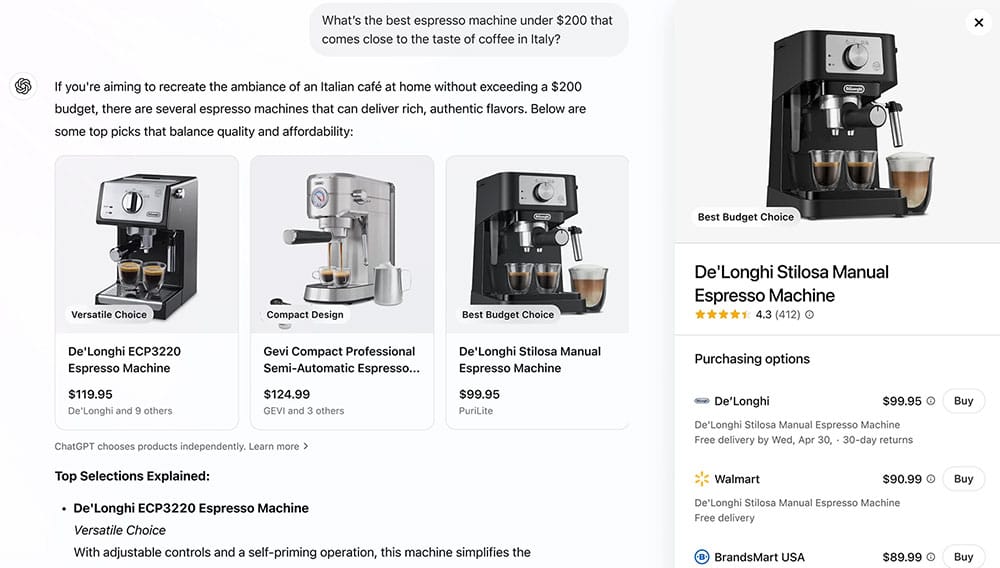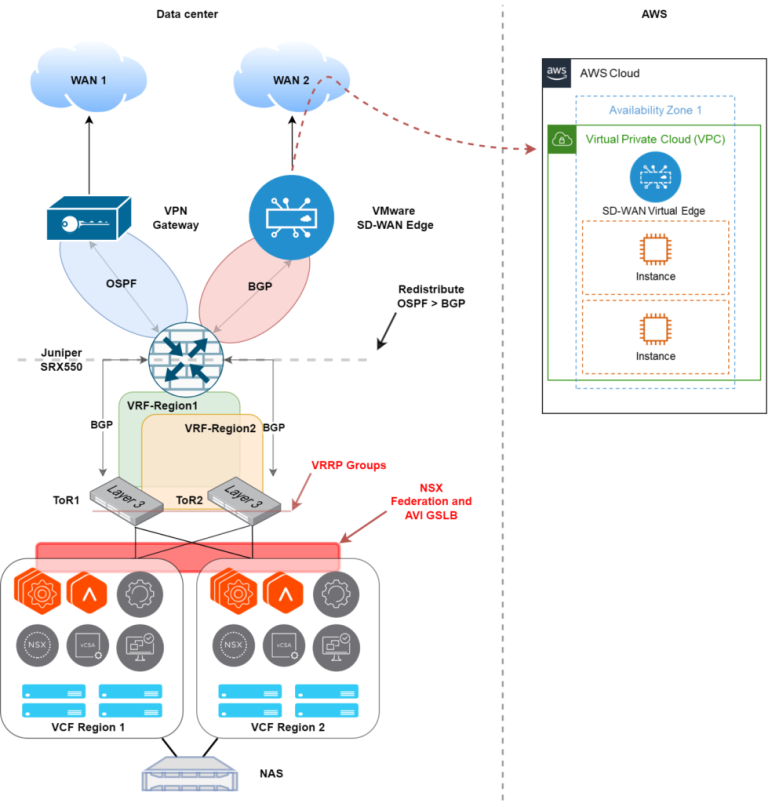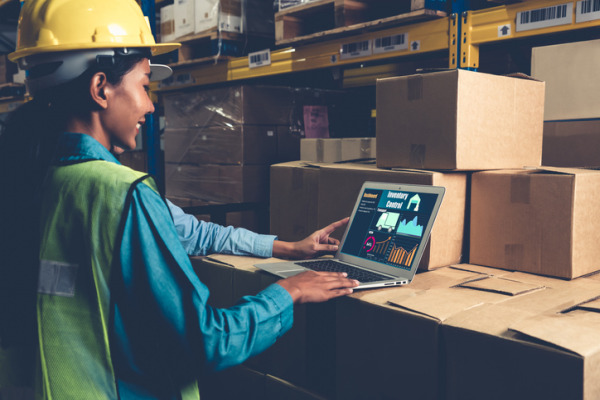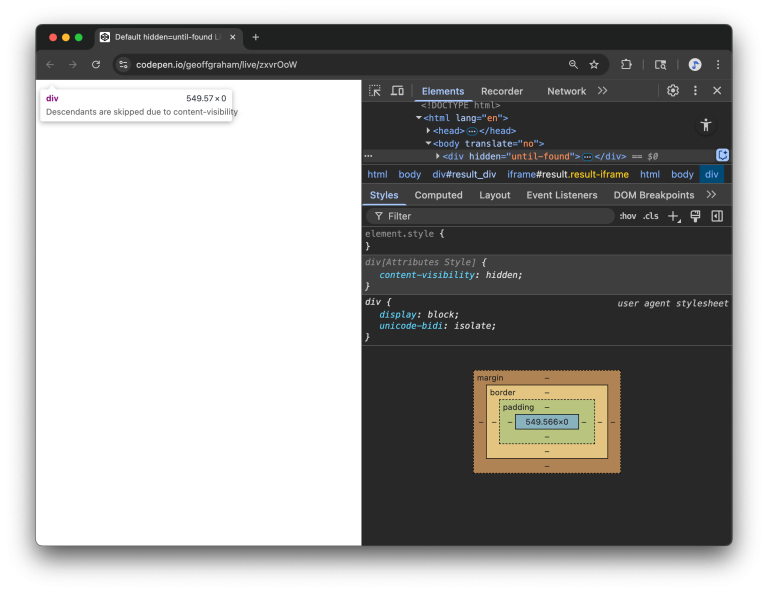OpenAI on Monday announced it is adding specialized shopping features to its ChatGPT chatbot. Some tech watchers see the move as an effort to compete with AI rival Google by creating a better, more personalized experience to find products and information online.
Users come to ChatGPT with all kinds of questions, and one common topic is researching and buying products, OpenAI explained on its website. Now, when a prompt suggests shopping intent, ChatGPT can display relevant product options in visually rich carousels, provide additional product details, and link users to websites where they can learn more or make a purchase.

ChatGPT’s shopping interface presents curated product picks directly in the chat, helping users explore options efficiently with suggestions tailored to user preferences. (Image Credit: OpenAI)
OpenAI added that ChatGPT selects products independently and does not display ads. When picking out products for a user, the AI considers structured metadata from third-party providers, such as pricing and product descriptions, and other third-party content, such as product reviews.
The shopping intelligence is included in all versions of ChatGPT, including its free offering.
OpenAI also teased that it will soon integrate its memory feature with its shopping features, but that will only be for Pro and Plus users. The memory feature will enable ChatGPT to reference a user’s previous chats to further personalize product recommendations.
“ChatGPT could become increasingly good at predicting an individual’s shopping preferences without a user specifying the parameters in a prompt,” noted Michael Roney, founder of Scout, an AI fashion tech company in Tampa, Fla.
“This would lead to tremendous value-add in the product discovery process if a model already knows the retailers I like the most, the prices I’m most likely to target, and the items I’ve bought in the past,” he told the E-Commerce Times.
Google in Crosshairs
Table of Contents
“By embedding tailored product suggestions directly in the chat interface, ChatGPT is challenging Google’s shopping and core search by collapsing the research-to-purchase journey into one seamless, personalized, conversational flow,” maintained Martin Balaam, CEO and co-founder of Pimberly, a SaaS-based solutions provider for product information and digital asset management, with offices in New York City and Manchester, England.
“This organic, non-promotional model — where results aren’t influenced by paid placements — could upend traditional affiliate marketing and force brands to rethink how they monetize partnerships and manage data feeds,” he told the E-Commerce Times.
“I do not think, however, that OpenAI will be able to sustain this non-promotional model for long,” he added. “It will inevitably introduce sponsored placements or affiliate revenue shares, as OpenAI will need constant revenue for ChatGPT to continuously develop.”
Monetization of ChatGPT shopping is almost certainly in its future, contended Venu Moola, CEO of Fleet Studio, a web and mobile application developer with offices in Princeton, N.J., New York City, and Chennai, India. “Right now, it’s about value creation and behavior shaping,” he told the E-Commerce Times. “Let people get used to the flow. Build trust. Learn what people really want from conversational commerce.”
“But down the line?” he asked. “I’d expect affiliate integrations. Strategic partnerships. Some revenue sharing baked in.”
“The key will be how transparent and non-intrusive those monetization layers are,” he continued. “People won’t mind a product suggestion that earns OpenAI a small cut, if they trust that the suggestion wasn’t driven by the cut. The line between utility and monetization has to be respected. Or this whole trust bridge collapses.”
“With the right safeguards, generative AI can make shopping easier by reducing search costs, summarizing reviews, and tailoring results to individual preferences,” added Ben Brooks, a fellow at the Berkman Klein Center at Harvard University.
“But if those results are skewed by commissions or paid ads, providers have a responsibility to make that clear to users,” he told the E-Commerce Times.
Inevitability of Advertising
Advertising, too, might be too tempting for the makers of ChatGPT shopping, although OpenAI CEO Sam Altman is tepid toward the prospect. “I’m not opposed [to advertising]. If there is a good reason to do it, I’m not dogmatic about this. But we have a great business selling subscriptions,” he told Ben Thompson in a Stratechery interview on March 20.
“Advertising will likely find its way in, but probably in a very subtle, AI-optimized form,” maintained Mark N. Vena, president and principal analyst with SmartTech Research in Las Vegas. “Rather than traditional banner ads, we might see ‘sponsored recommendations’ that blend into natural conversations. “
“OpenAI will need to balance user trust with revenue generation carefully, but commercial pressures will push toward some form of integrated advertising over time,” he told the E-Commerce Times. “Advertising is almost an irresistible opportunity that ChatGPT will not pass up.”
Greg Sterling, co-founder of Near Media, a market research firm in San Francisco, agreed. “ChatGPT is burning so much cash that they will need to find additional revenue streams. Some version of advertising on ChatGPT is inevitable,” he told the E-Commerce Times.
Threat to Amazon?
ChatGPT’s new shopping feature may also impact Amazon’s dominance in product search. “ChatGPT shopping could siphon off some of Amazon’s casual search-driven purchases,” Vena said. “If users start relying on AI conversations for trusted product recommendations, they might bypass traditional Amazon browsing altogether.”
“Even if ChatGPT doesn’t sell directly, influencing purchase decisions upstream could weaken Amazon’s search dominance,” he added. “It could also steer users toward a wider set of retailers, reducing Amazon’s lock on e-commerce discovery.”
“If done right, ChatGPT could become an alternative to Amazon that would treat Amazon as Amazon fronts other smaller retailers,” added Rob Enderle, president and principal analyst with the Enderle Group, an advisory services firm in Bend, Ore.
“The issue will be trust,” he told the E-Commerce Times. “If you aren’t paying for the service, those providing the funding will likely bias the recommendations, making them far less trustworthy. It isn’t that AI can’t do this well, but this approach will likely mean it won’t by design.”
Sterling noted that ChatGPT shopping could siphon off some small purchase volume that might have gone to Amazon. However, Amazon loyalty is so strong as default behavior — at least for purchases — that an adverse impact, if any, will be marginal at best.
“There may be a greater impact on Google shopping queries than Amazon,” he said. “A growing number of people are using AI tools for searches they would have previously done on Google. The numbers are still comparatively small, but they are growing.”
ChatGPT Could Aid Product Discovery
Ross Rubin, the principal analyst at Reticle Research, a consumer technology advisory firm in New York City, pointed out that even if Amazon isn’t the origin point of a search, it could still wind up being where the transaction occurs. “So for the near term, ChatGPT shopping is not likely to have much impact — just as it didn’t have much impact in the default search wars between Google and Microsoft,” he told the E-Commerce Times.
“There’s still a lot in Amazon’s favor in terms of selection, consumer trust, and the investment that consumers make in Prime,” he added.
Online shopping can be a frustrating experience for many consumers, noted Damian Rollison, director of market insights at SOCi, a marketing solutions company in San Diego.
“Despite the wide availability of products of every description, the market is saturated with poor quality options propped up by inflated marketing, deceptive SEO, and fake or incentivized reviews,” he told the E-Commerce Times. “ChatGPT may be able to cut through the noise and provide consumers with a concierge shopping experience that gets them to the right product faster and with more confidence.”
“The new shopping integration augments ChatGPT’s existing search capabilities by making it easier for the chatbot to surface links where customers can complete transactions and incentivizes marketers to make their online offerings friendly to ChatGPT crawlers,” he said. “ChatGPT’s native strength as a provider of nuanced advice and recommendations could be leveraged here to make it a powerful shopping tool.”





